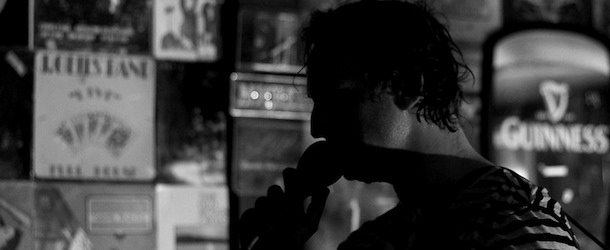photo by Chris Dinan
intro by Jacob Zlomke | interview by Chance Solem-Pfeifer
Album Review Podcast
Lithium Burn by Deleted Scenes treads, at least through prevailing critical lenses, largely in binaries: tender and aggressive, pop and anti-pop, intellectual and emotional.
The third full-length from Deleted Scenes swoops, almost calculatedly from track to track, between ritalin-induced anxiety, fast-beating hearts, sweaty palms and a nervous gut that wants to tear itself apart, to nearly serene moments of clarity between panic attacks. The effect is almost nauseating, and most apparent between tracks three and five.
“Landfall,” while not necessarily emotionally resolved compared to, say, any Iron and Wine track, offers respite from the sprinting headspin of the preceding “Caught in the Brights” and “Haircuts/Uniforms.” Following “Landfall,” “Let’s Not Try to Fix Everything at Once” traffics anxiety in the most classic sense on the album, as frontman Dan Scheuerman adds to a fretful to-do list of all the things that are not being accomplished. Instrumentally, the track ends in swirling panic and hangs in a brief moment of silence before “Seasons of the Wire” begins. “Seasons” is similarly a list of maybe all the reasons that nothing gets crossed out of the previous track’s errand list.
As with “Landfall,” it’s by no means a peaceful song. But it’s comparatively a lull, more at peace with its own disquietude.
These three tracks together illustrate motion of Lithium Burn: from swell to uneasy calm and back again. All the while, the S.S. Deleted Scenes rides these waves, the crew doing it’s best to navigate frustration and panic. The percussion rows the album forward, oars dipping in an out of water, persistently pushing forward no matter the conditions.
And just as the anger, anxiety, frustration embodied on Lithium Burn, those same feelings that the album navigates, often come from within, so did Deleted Scenes masterfully create their own ocean of squalls and landfalls.
See Deleted Scenes in Omaha Thursday night Slowdown with Millions of Boys and Talking Mountain. RSVP here, and read an interview with frontman Dan Scheuerman below.

photo by Molly Misek
Hear Nebraska: You’ve said that in some ways if the first two Deleted Scenes albums are about anxiety and denial, respectively, that Lithium Burn is in some ways about anger. And I’m curious, if it’s an album that expresses its anger, it doesn’t necessarily do it through sheer volume or shredding. Is the anger more dramatic or more simmering if it’s nuanced?
Dan Scheuerman: I’m sure it is. Anything is better nuanced. If we were Slayer, maybe that would be a better expression of the anger. But nothing is just itself. So it’s not just about anger, but it’s definitely acknowledging anger in a way that the previous records did not. There’s always a sense of humor to the lyrics and irony.
HN: What would you say are the angriest songs on the record? What comes to mind?
DS: “You Get To Say Whatever You Want” and “Landfall.”
“Landfall” is this song about losing control and starting to say stuff and hearing yourself say stuff to a loved one that you know is not coming from a place of love. Seeing yourself lose control and being beside yourself watching yourself do that. That process is not like a raging process, but more of watching yourself and being disappointed in yourself, and that’s kind of quiet. The songs calls forth the image of a hurricane hitting the shore and it’s this force that you just can’t stop.
It’s a balance between watching yourself from above and watching something maybe powerful and quiet. And within that is total chaos.
HN: Maybe this relates to the fact that you say this is a more head-on record, but you’ve also told the press that in terms of any indictments on here, you feel more comfortable in doing that. In my reading, at least, of “You Get To Say Whatever You Want” it sort of touches on the futility of being able to say whatever you want. What do you see the relationship as maybe being between anger and futility on the record?
DS: It’s not an empowering statement, it’s an ironic statement. “You get to say whatever you want,” as in you’re in a position of privilege to be able to shoot your mouth off. Obviously, the Occupy imagery is kind of symbolic of that, it’s not about Occupy. It’s about a person, an individual person who seems to get away with doing shitty things to people. “You get to say whatever you want,” like, “OK, man” because it’s who you are.
And it is futile to try and engage. So that song is kind of a futile song. It does say that I’ll bite my tongue. It refuses to engage and it considers engaging and it wants to, but it’s ultimately giving up on it.
HN: I wonder if I could go here, Dan. And I ask this not to mud-sling, but I think it’d be an interesting to talk about. In terms of the Pitchfork review you guys received — and I’ve read it a few times now and have developing feelings on it — but Mr. Cohen really seems to read this album as a piece of autobiography. And as consumers of art or English majors or something, we’re taught that that can be problematic. But more-so than that, he seems to read Lithium Burn as being about Deleted Scenes and its band-ness. And I’m wondering how you feel about that.
DS: That’s such an interesting angle on the band. Because as a person who’s consistently plumbed my life for truth and tried to put it into song, there is an inextricable link between me and the music and the band and its history. But, God, that’s gotta be true of anyone who makes art and music.
Now, I’m not Sylvia Plath. [Laughs] But maybe I am more than I know. To be honest, I haven’t read the Ian Cohen review. I heard it was bad and then my wife read it and she suggested me not reading it. I let her paraphrase it. ‘Cause I don’t need that guy’s barbs sneaking up on me in the middle of the night. I can deal with his thesis, which I guess is “this band hasn’t become famous and they’re not worth your time…” I don’t know. I don’t know what he was trying to say.

photo by Molly Misek
HN: Well, it’s probably moot if you haven’t read the review. And that’s fine. I’m fine moving past that.
DS: Are you asking if the record is about the band?
HN: Yes, and I think that’s a huge part of Cohen’s thesis.
DS: Well, I don’t really like art about art. Like I hate songs that are about songs.
HN: Why?
DS: I just don’t think anyone cares.
I always try to write about something human. I don’t wanna write about … it’s like this trend of movies where the protagonist is the writer trying to make a movie. They’ve produced some pretty cool ones, doing something interesting with the form. Like that one with Nicolas Cage…
HN: Adaptation.
DS: Adaptation is great. But, I don’t know, there’s something really ansular and irrelevant about writing about writing. But then, you know, to say that the relationships in the band and the place of the band in my life wasn’t a part of what I was going through, that would be untrue.
Well, “Let’s Not Try To Fix Everything At Once” … I think [Cohen] kind of focused on that one. It’s really a love song, a plea for understanding from a loved one. It’s about trying to make it in life and not knowing where you are.
I really feel like anybody can relate to that.
HN: You would think.
DS: [Laughs] I would hope. The song is about being a young adult. Like who isn’t struggling with their college loans?
HN: Not to get too categorical with this, but I often think of some of the tension and anxiety in your music as feeling very sort of post-modern, but the way you describe the lyrical aims as being relatable and emotional — and not some kind of meta-commentary — is very not post-modern.
DS: Cool.
HN: What do you like to read, just out of curiosity?
DS: My favorite authors are Flannery O’Connor and David Foster Wallace. So, very post-modern and sort of modernist comical and ironic. And definitely Catholic. There’s a deep Catholicism to my point of view and whether I’m not a Catholic now, I was born and raised that way.
HN: I wanted to bounce next off an article you posted about rock critics and how they relate to DC music. The writer postulated there’s kind of this unfortunate, seemingly obligatory reference that has to be made to Fugazi or Dismemberment Plan, even when they’re talking about unrelated bands. I was curious if we could relate this to Omaha at all, and if you think Nebraska deals with the same thing when it comes to some critics having a benchmark relationship to Kasher or Conor Oberst or something like that.
DS: Yeah, I mean I have made that comparison in conversation before. There’s a shadow, definitely, I mean, it doesn’t bother me. It’s just so natural to make those connections. And there is a connection, but we’re just as influenced by Radiohead as we are by Dismemberment Plan. They’re a great band. But you know, I don’t know. Do I think Omaha musicians suffer from it? I honestly haven’t done a study of it. I don’t really know what reviews say about All Young Girls Are Machine Guns. I have no idea what the Twinsmith reviews look like.
HN: Let me duck back to the record. I think there’s a very distinct sense of urbanness on this album in its hustle and a few of its specific lyrical references, some of which are on “Seasons of the Wire.” Is it fair to say that you write city music or maybe music that invokes urban spaces?
DS: Not consciously. Although I haven’t been around a lot of nature and don’t generally find inspiration in nature. I guess I go with what’s around me. I wouldn’t say we’re urban like Lou Reed is urban with destitution and poverty and dehumanization. But inasmuch as I live in an environment, I figure that influences me and my life.
HN: Now, I know the previous months have been a whirlwind, but have you had much of a chance to write music since you’ve been an Omaha guy?
DS: No, honestly, I haven’t. Although I did write probably half the lyrics [to Lithium Burn] in Omaha. We got the melodies all together with starter lyrics and then I did have four of five months in Omaha after the initial writing sessions to finish up the lyrics. I was in Omaha when I wrote “Seasons of the Wire,” walking around on 50th Street. I was living in Dundee trying to finish up the lyrics.
HN: Technical question, then, when you say “starter lyrics,” are you using vowels or fill-in words when you’re all cooped up together writing, until the point when you can write the real lyrics?
DS: Yeah, there’s a lot of that. Vowels. Especially in songs where I didn’t write the initial musical idea. On this album, Dominic and Matt wrote a lot of the initial ideas. But, yeah, I’d sing nonsense words until I came up with a single phrase I felt boiled down the essence of the song. And then I’d kind of write an essay to myself about that one line and what could that mean and where could it go. I do a lot of free writing. For every one line on the record, there’s probably a notebook. No, that’s not true. But, yeah, I fill notebooks with bad lyrics.
HN: So you’re going from single phrase to prose to poetry. Is that a weird lyrical journey to reflect on?
DS: No, not to me. That’s just how I do it. I mean … I’ve gotta get the lyrics done! [Laughs] I don’t want them to suck. I just want to write something true. That’s the only thing I want to do.
HN: My last one, Dan, and I hope you don’t find it too sensational of a question, but you locking into one person at the end of your sets like I saw you do in Austin. Have you always done that? Is that a new thing?
DS: It’s a combination of all these things … I started to do that with “You Get To Say Whatever You Want.” I was like choking myself with the mic cable to express somehow what was going on in the song. But one, it hurt, and two, I felt like it needed to be expressive. Confrontational rather than just tortured. So I started going out into the audience a little bit. I’ve done it where I’ve singled someone out and then done it where I go from person to person.
It’s a combination of I don’t play guitar on that song. And I just feel the songs so strongly, I want to do something about it.

photo by Molly Misek
Chance Solem-Pfeifer is Hear Nebraska’s managing editor. Jacob Zlomke is Hear Nebraska’s staff writer. Reach them at chancesp@hearnebraska.org and jacobz@hearnebraska.org.




